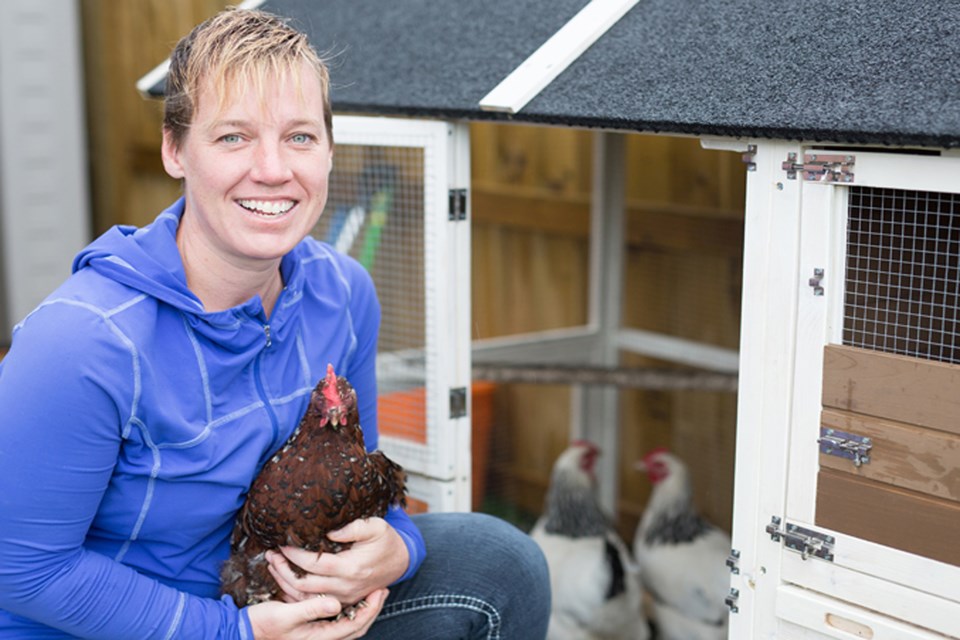INNISFAIL – Two and a half years ago, Innisfailian Lisa Reid had to let go of her beloved chickens after town council voted against having pet fowl in the community.
As of May 1, she just might be able to start fresh with a new flock.
On March 8, town council unanimously approved a two-year pilot program. If it’s successful, council can then extend it permanently. If not, then it ends, most likely for good. But for now, pet fowl has the green light, with up to five household applicants getting licences, possibly by a draw system if there are more.
Nevertheless, Reid, who championed the pet chicken issue in 2018, is just grateful the town is finally bringing in a program that has been successful in many other communities across Alberta.
“This is absolutely amazing. This is a really good decision for the town to make. I know with all the changes and problems with town council this is amazing that it has finally come forward,” said an elated Reid last week who went to town hall for more information on the new program’s application process. “I am sad that I had to lose my birds back in those days. I won’t be able to get them back now.
“I will start with new fresh birds, and I really look forward and hope this town will see how really good this is going to be for people,” said Reid, adding she will support any other successful applicant with her pet chicken expertise. “Even if I’m not chosen to get pet chickens this time around, I am fully open to helping others in the town starting up, and if they need some help or guidance, I am there for them.”
With the official start date of May 1, the new Urban Hen Pilot Program Bylaw, crafted meticulously by Vanessa Connors, the town’s legislative executive assistant, states the cost for each of the five annual licences will be $65. Each licence allows the household to have between two and four chickens.
The town is hoping to begin accepting applications by April 1. Citizens are required to have proof of approval from adjacent neighbours. The process for that is still being developed by the town.
The bylaw calls for coop dimensions to be included in the applicant’s site plan. There is also a five-foot fencing requirement.
While there is still some work for the town to do on bylaw procedures before the pilot program’s May 1 launch, Mayor Jim Romane is pleased a workable solution has finally been created for the nagging pet chicken issue that has been pecking away on the town’s heels since 2018.
“We have spent enough time talking about it, working on it, so let’s get it in motion,” said Romane, adding the bylaw has built-in measures to appease all citizens, including those who oppose pet chickens.
“One condition is getting letters of support from their neighbours, and I know there are still questions as to how that should work, but I am of the feeling that if people want it, they can go to their neighbours and get support for it. That should be the responsibility of the applicant to get that support.”
Innisfail’s urban chicken issue was resurrected last summer by Coun. Don Harrison following a citizen’s letter to the town expressing a desire to have a program. In 2018, the issue came to a public survey vote that showed overwhelming support for an urban chicken program, but a subsequent town council vote to implement one was defeated.
Throughout the fall of last year, town administration worked hard to find an appropriate solution, one that jettisoned all notions of bringing the issue to another public vote, either through a plebiscite or referendum.
“I am really happy council and administration has put this policy together, and we’re going out to the community with a two-year pilot,” said Harrison, noting the benefits pet chickens could bring to citizens. “We all talk about mental health, and we look at pet therapy. Young children like to have pets, and it’s soothing. Pet therapy is an approved natural remedy for mental health issues.
“And also, just being able to raise your own eggs. It’s completely organic,” said Harrison, noting pet owners will not be allowed to sell eggs.
“Four hens once they are mature will give you four eggs a day. For a family of four it is a breakfast a day.”



